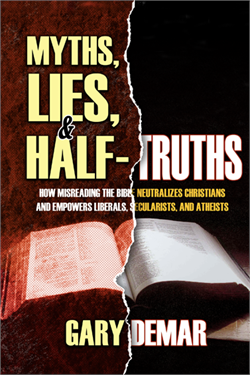Gary concludes his talk about Christian involvement in culture and politics by summarizing several popular objections.
Pastor and author John Piper uses Hebrews 13:14, 1 Peter 2:11, and Philippians 3:20 in an attempt to dispel the idea that Christians can have a lasting impact on this world. He writes that Christians “exert influence as happy, brokenhearted outsiders” who should only count on having limited and temporal success this side of heaven. The above passages have nothing to do with the success of Christian involvement in the world. The writer to the Hebrews (13:14) is contrasting the soon-to-be judged city of Jerusalem (Matt. 24:1–34) with that of “the city which has foundations, whose architect and builder is God” (Heb. 11:10). Earlier in Hebrews we read, “But you have come to Mount Zion and to the city of the living God, the heavenly Jerusalem…” (12:22; cf. Gal. 4:26). This new city, the heavenly Jerusalem, is a present reality while we are in this world. It’s the reality of Jesus’ redemptive work that makes our work possible in the here and now.
Peter’s description of Christians in the first century “as aliens and strangers” (1 Pet. 2:11) is a reference to their alienation from old covenant Judaism. Those in Christ are the true people of God, “a chosen race, a royal priesthood, a holy nation, a people for God’s own possession” (1 Pet. 2:9). Before Christ, they “were not a people” (1 Pet. 2:10).
Piper is wrong when he writes that “American culture does not belong to Christians, neither in reality nor in biblical theology. It never has. The present tailspin toward Sodom is not a fall from Christian ownership, ‘the whole world lies in the power of the evil one’ (1 John 5:19)… God’s rightful ownership will be manifest in due time.” “World” in this context, does not mean the earth but only those who are outside of Christ, otherwise John would be saying that our families and even the church are under the dominion of Satan. Peter describes the “world” at the time of Noah’s flood as being “destroyed, being flooded with water” (2 Pet. 3:6). But what was actually destroyed? “The ‘world’ that was destroyed,” Paul Marshall writes, “was not the ‘world’ of the creation itself but the ‘world’ of sinful people. The sinful world—the conspiracy of evil against God—was destroyed. But Noah and his family and the animals and the birds were rescued in order to begin life again.”
“God’s rightful ownership” has been from the beginning. God is “a great King over all the earth” (Ps. 47:2). Jesus reinforces this truth when He tells His disciples, “All authority has been given to Me in heaven and on earth” (Matt. 28:18). The true outsiders are the usurpers who claim that this world is their world. Following Piper’s view, Christians are immigrants, or at best second-class citizens, in a world created for rebels but owned by God and redeemed by Jesus. This makes no sense.

Myths, Lies, and Half-Truths
Too many Christians believe that the Bible is irrelevant this side of heaven. This book takes a closer look at God's Word and applies it to erroneous misinterpretations of the Bible that have resulted in a virtual shut-down of the church's full-orbed mission in the world (Acts 20:27). Due to these mistaken interpretations and applications of popular Bible texts to contemporary issues, the Christian faith is being thrown out and trampled under foot by men (Matt. 5:13).
Buy NowGary concludes his talk about Christian involvement in culture and politics by summarizing several popular objections. In his book, Myths, Lies, and Half-Truths, Gary answers 15 common objections that Christians give to not get involved, but he points out that God leaves His people here for that very reason. Heaven may be our ultimate home, but Earth is our home now and needs the spiritual discernment and physical work of Christians.

